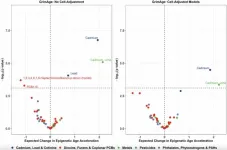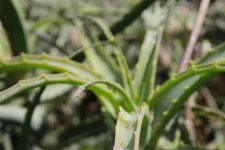(Press-News.org) Researchers at the Herbert Wertheim School of Public Health and Human Longevity Science and Moores Cancer Center at University of California San Diego have found that, among smokers in the United States, e-cigarette use does not increase smoking cessation and is actually associated with reduced tobacco abstinence. The findings, published March 5 in JAMA, refute the notion that e-cigarettes can help people quit, a common misperception among tobacco users and e-cigarette proponents.
“Most smokers think vaping will help you quit smoking,” said study co-author John P. Pierce, Ph.D., Distinguished Professor in the Herbert Wertheim School of Public Health. “However, this belief is not supported by science to date. While some researchers have suggested that smokers who switch to daily vaping will be more successful in quitting smoking, We studied quitting success among both daily and non-daily vapers and came up with a quite definitive answer.”
The new study analyzed data from over 6,000 U.S. smokers from the Population Assessment of Tobacco and Health Study, a nationally representative sample of U.S. cigarette smokers. There were 943 smokers who also vaped and by matching and comparing these to similar smokers who didn’t vape, they found:
Smoking cessation was actually 4.1% lower among smokers who vaped daily.
Similarly, smoking cessation was 5.3% lower among smokers who vaped, but not daily, compared to matched smokers who did not vape.
According to the CDC, almost 20% of people in the U.S. use tobacco products. While the majority of these people are cigarette smokers, some people have switched from smoking to vaping in recent years, in part because vaping is generally perceived as less harmful. This perception contributes to the belief among many smokers that vaping is an effective way to “taper off” of cigarettes.
Considering the potential dangers of vaping, the researchers note that while e-cigarettes don’t have the same health consequences as smoking, they are not harmless.
The adverse health effects of cigarette smoking become obvious after people have smoked for 20 years,” added Pierce, a former director for population sciences at Moores Cancer Center. “While vapes generally don’t contain the same harmful chemicals as cigarette smoke, they have other risks, and we just don’t yet know what the health consequences of vaping over 20 to 30 years will be.”
One unique strength of the study is that the researchers were able to control for a wide range of other variables that are well-known to be associated with quitting, including whether they were non-daily cigarette smokers, interest in quitting (including a recent quit attempt), the presence of a smoke-free home, and socioeconomic factors.
“For example, if a smoker is already very interested in quitting, has a smoke-free home, and does not smoke daily, they are much more likely to successfully quit regardless of whether they vape or not,” said senior author Karen Messer, Ph.D., professor of biostatistics in the Herbert Wertheim School of Public Health. “We matched each smoker/vaper on such characteristics. You have to make very sure you’re comparing like with like, and that’s why this analysis is so definitive.”
According to the researchers, failing to adequately account for these confounding factors in previous studies is part of why misconceptions about e-cigarettes have persisted so long.
"As the public health community continues to grapple with the complexities of tobacco control, it is essential that we rely on rigorous scientific evidence to inform our policies and interventions,” added Messer, who is also director of the Biostatistics Shared Resource at Moores Cancer Center. “Our research shows that misleading associations between vaping and smoking cessation routinely occur unless confounding characteristics are carefully accounted for.”
In addition to providing definitive evidence about a contentious question in tobacco research, the study's results have important implications for public health policy and practice surrounding e-cigarettes, particularly how they are marketed to adolescents, for whom e-cigarettes are often a gateway to nicotine dependence.
“There’s still a lot we don’t know about the impact of vaping on people,” said Natalie Quach, a third-year biostatistics Ph.D. student at the Herbert Wertheim School of Public Health and the study’s first author. “But what we do know is that the idea that vaping helps people quit isn’t actually true. It is more likely that it keeps them addicted to nicotine.”
Co-authors of the study include: Jiayu Chen, Brian Dang, Matthew D. Stone, David R. Strong, Dennis R. Trinidad and Sara B. McMenamin, all at UC San Diego.
This project was supported by the Tobacco-Related Disease Research Program (TRDRP) of the University of California Office of the President (T31IR-1584 & T32IR-4988).
# # #
END
Study: Vaping does not help US tobacco smokers quit
Vaping, especially daily vaping, may actually make it harder to quit smoking, according to new research from UC San Diego
2025-03-05
ELSE PRESS RELEASES FROM THIS DATE:
Insect populations are declining — and that is not a good thing
2025-03-05
Insect populations, foundational to food chains and pollination, have dramatically declined over the past 20 years due to rapid climate change
Scientists identify two ways fly species from different climates (high-altitude forest and hot desert) have adapted to temperature
Paper provides evidence that changes in brain wiring and heat sensitivity contributed to shifting preference to hot or cold conditions, respectively
Results may help predict the impact of ongoing climate change on insect distribution and behavior
EVANSTON, Ill. --- Tiny, cold-blooded animals like flies depend on their environment to regulate body temperature, ...
Scientists discover genes to grow bigger tomatoes and eggplants
2025-03-05
Bigger, tastier tomatoes and eggplants could soon grace our dinner plates thanks to Johns Hopkins scientists who have discovered genes that control how large the fruits will grow.
The research—led by teams at Johns Hopkins University and Cold Spring Harbor Laboratory—could lead to the development of new varieties of heirloom tomatoes and eggplants, including those that help support agriculture in areas around the world where local varieties are currently too small for large-scale production.
Findings were published in the journal Nature.
“Once ...
Effects of combining coronary calcium score with treatment on plaque progression in familial coronary artery disease
2025-03-05
About The Study: The combination of coronary artery calcium (CAC) score with a primary prevention strategy in intermediate-risk patients with a family history of coronary artery disease was associated with reduction of atherogenic lipids and slower plaque progression compared with usual care. These data support the use of CAC score to assist intensive preventive strategies in intermediate-risk patients.
Corresponding Author: To contact the corresponding author, Thomas H. Marwick, MBBS, PhD, MPH, email Tom.Marwick@bakeridi.edu.au.
To ...
Cancer screening 3 years after the onset of the COVID-19 pandemic
2025-03-05
About The Study: In 2023, reported breast and colorectal cancer screening rebounded from COVID-19 pandemic–related declines and surpassed pre-pandemic estimates. These findings are encouraging given larger-than-expected declines in early-stage breast and colorectal cancer diagnoses in 2020 and increases in distant-stage breast cancer diagnoses through 2021. Cervical cancer screening rates remained below pre-pandemic levels, a troubling trend as early-stage diagnoses continued to decrease in 2021. The persistent decline may in part reflect longer-term declines in patient knowledge and clinician recommendation of cervical cancer ...
Trajectories of sleep duration, sleep onset timing, and continuous glucose monitoring in adults
2025-03-05
About The Study: In this cohort study of middle-aged and older participants, persistent inadequate sleep duration and late sleep onset, whether alone or in combination, were associated with greater glycemic variability. These findings emphasize the importance of considering both sleep duration and timing for optimizing glycemic control in the general population.
Corresponding Authors: To contact the corresponding authors, email Ju-Sheng Zheng, PhD, (zhengjusheng@westlake.edu.cn) and Yu-ming Chen, PhD, (chenyum@mail.sysu.edu.cn).
To access the embargoed study: Visit our For The Media website at this link ...
Sports gambling and drinking behaviors over time
2025-03-05
About The Study: This study found that over time, the trajectory of sports gambling frequency was associated with the trajectory of alcohol-related problems. Screening and treatment interventions are recommended for sport gamblers who also drink concurrently, especially because this group appears to be at an elevated risk for developing greater alcohol-related problems over time.
Corresponding Author: To contact the corresponding author, Joshua B. Grubbs, PhD, email joshuagrubbs12@unm.edu
To access the embargoed study: Visit our For The Media website at this link https://media.jamanetwork.com/
(10.1001/jamapsychiatry.2025.0024)
Editor’s Note: Please ...
For better quantum sensing, go with the flow
2025-03-05
Combine a garden-variety green laser, microwaves with roughly the energy of your wi-fi, and some diamond dust in drops of water, and what do you get? A precise chemical detection tool.
For the first time, researchers have combined nanodiamonds in microdroplets of liquid for quantum sensing. The new technique is precise, fast, sensitive, and requires only small amounts of the material to be studied – helpful when studying trace chemicals or individual cells. The results were published in the journal Science Advances in December.
“We weren’t even sure ...
Toxic environmental pollutants linked to faster aging and health risks in US adults
2025-03-05
“Environmental chemical exposures represent a key modifiable risk factor impacting human health and longevity, and our findings provide evidence for associations between several environmental exposures and epigenetic aging in a large sample representative of the US adult population.”
BUFFALO, NY — March 5, 2025 — A new research paper was published in Aging (Aging-US) on February 11, 2025, Volume 17, Issue 2, titled “Exposome-wide association study of environmental chemical exposures ...
Jerome Morris voted AERA President-Elect; key members elected to AERA Council
2025-03-05
Jerome E. Morris, the E. Desmond Lee Endowed Professor of Urban Education at the University of Missouri–St. Louis, has been voted president-elect of the American Educational Research Association (AERA). Morris joins the AERA Council in 2025–2026 as president-elect, and his presidency begins at the conclusion of the association’s 2026 Annual Meeting.
Morris leverages his upbringing in public housing and attending predominantly Black public schools in Birmingham, Alabama, to inform his research, which examines the intersection of ...
Study reveals how agave plants survive extreme droughts
2025-03-05
WASHINGTON — Agave plants may be best known for their role in tequila production, but they are also remarkably adept at retaining water in extremely dry environments. In a new study, researchers used terahertz spectroscopy and imaging to gain new insights into how these succulents store and manage water to survive in dry conditions.
“Understanding how plants adapt to dry conditions could lead to better farming practices and be used to develop crops that require less water,” said Monica Ortiz-Martinez ...
LAST 30 PRESS RELEASES:
Research alert: Understanding substance use across the full spectrum of sexual identity
Pekingese, Shih Tzu and Staffordshire Bull Terrier among twelve dog breeds at risk of serious breathing condition
Selected dog breeds with most breathing trouble identified in new study
Interplay of class and gender may influence social judgments differently between cultures
Pollen counts can be predicted by machine learning models using meteorological data with more than 80% accuracy even a week ahead, for both grass and birch tree pollen, which could be key in effective
Rewriting our understanding of early hominin dispersal to Eurasia
Rising simultaneous wildfire risk compromises international firefighting efforts
Honey bee "dance floors" can be accurately located with a new method, mapping where in the hive forager bees perform waggle dances to signal the location of pollen and nectar for their nestmates
Exercise and nutritional drinks can reduce the need for care in dementia
Michelson Medical Research Foundation awards $750,000 to rising immunology leaders
SfN announces Early Career Policy Ambassadors Class of 2026
Spiritual practices strongly associated with reduced risk for hazardous alcohol and drug use
Novel vaccine protects against C. diff disease and recurrence
An “electrical” circadian clock balances growth between shoots and roots
Largest study of rare skin cancer in Mexican patients shows its more complex than previously thought
Colonists dredged away Sydney’s natural oyster reefs. Now science knows how best to restore them.
Joint and independent associations of gestational diabetes and depression with childhood obesity
Spirituality and harmful or hazardous alcohol and other drug use
New plastic material could solve energy storage challenge, researchers report
Mapping protein production in brain cells yields new insights for brain disease
Exposing a hidden anchor for HIV replication
Can Europe be climate-neutral by 2050? New monitor tracks the pace of the energy transition
Major heart attack study reveals ‘survival paradox’: Frail men at higher risk of death than women despite better treatment
Medicare patients get different stroke care depending on plan, analysis reveals
Polyploidy-induced senescence may drive aging, tissue repair, and cancer risk
Study shows that treating patients with lifestyle medicine may help reduce clinician burnout
Experimental and numerical framework for acoustic streaming prediction in mid-air phased arrays
Ancestral motif enables broad DNA binding by NIN, a master regulator of rhizobial symbiosis
Macrophage immune cells need constant reminders to retain memories of prior infections
Ultra-endurance running may accelerate aging and breakdown of red blood cells
[Press-News.org] Study: Vaping does not help US tobacco smokers quitVaping, especially daily vaping, may actually make it harder to quit smoking, according to new research from UC San Diego




